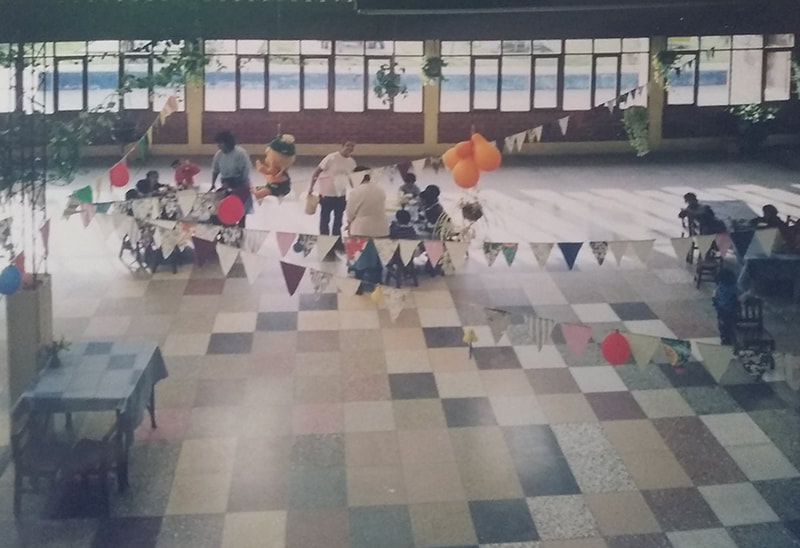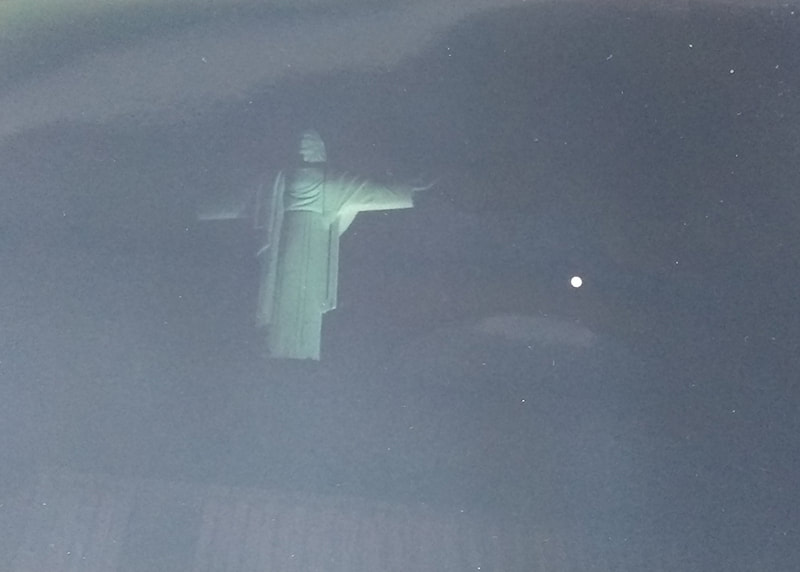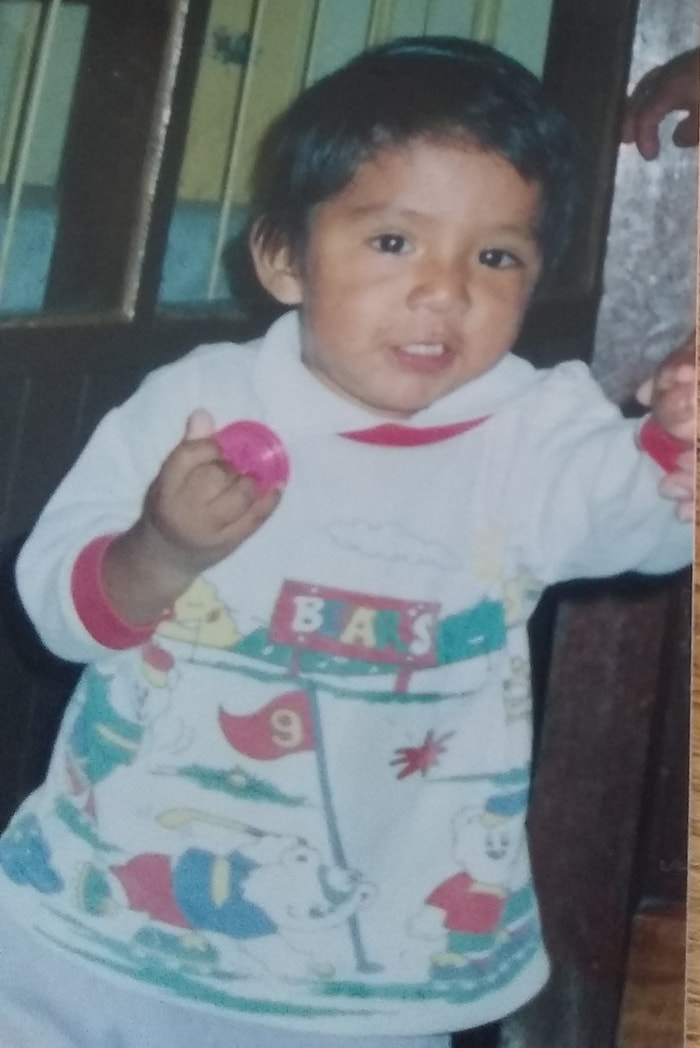|
My name is Maggie Brown and I am from England. As a child I had always wanted to go abroad and help somehow. It was a childhood dream really. What I didn't know was that years later thanks to my mum that dream would become a reality.
I had been teaching as a primary school teacher for about three years when my mum said to me one day, "Would you like to go and work with the street children and orphans in South America?" She went on to tell me all about a certain catholic priest who had founded the charity 'The Project For Bolivia.' She also told me there was an opportunity for me to go for six months to help look after street children and orphans in Cochabamba, Bolivia. I was very excited and immediately applied. I got through the two interviews. I was told that I had to raise £3000 myself to fund my flight and to go towards the charity. Through my mum's creative ideas and enthusiasm we both forged ahead and began our fund raising. We knocked on doors selling raffle tickets, went around pubs also selling raffle tickets and also hosted a jumble sale. The primary school I was working in at the time also kindly raised £600 of the money I needed too. So there I was in January 1999 having had numerous vaccinations and all ready to go on my exciting adventure to Bolivia. After the very long flight, I finally arrived in the city of Cochabamba. I was met by a lovely nun called Sister Stephanie who very kindly drove me to 'Sayaricuy' the place where I would be staying. After a long and refreshing sleep in my apartment at Sayaricuy, I went downstairs to say good morning to Sister Stephanie. She told me I was allowed four days off to recover from the jet lag so she didn't expect me to work in that time at all. I spent those days walking around the large lake near my apartment. I was struck by the amazing Jesus Christ statue that towered above the city. At night-time from my apartment window I could see it illuminated and I loved the way the Jesus Christ statue's arms were held out as if to say "These are my beautiful Bolivian people who I have created. They are very precious to me." In the evenings of those first few days, I had wonderful times playing cards with the boys that also lived at Sayaricuy. They were very warm and friendly and I felt very happy in their company. The four days soon passed and I was told to catch a bus into the city and make my way to 'Madre De dios' the school for street children and for children who's parents needed to work during the day. It was a very special place as it provided day care, food and lessons for the children. I worked in the school room with the teacher. The children were lovely and full of life. I met one of the nuns who worked there called Sister Mary. She was American and it was lovely to be able to speak to her in English as my Spanish was not very good. After three weeks of working at the school and living alone in the apartment at Sayaricuy, I began to feel very lonely. I asked Sister Mary if I could move to Hogar Salomon Klein (the orphanage for 0-6 year old children) to work with the younger children. I also knew there was accommodation there and I would be able to make friends with the other volunteers that lived there. She was very kind and allowed me to go. I was so happy when I arrived at Hogar Salomon Klein. I was shown upstairs to my room and there I met a lovely group of volunteers from other countries all over the world. Many of them became great friends. I also met Emma (the director of Hogar Salomon Klein) and was given two pale blue pinafores to wear at work. I was introduced to the ladies who looked after the children. They were called 'Mamas' and the rooms where the children played were called 'Salas.' My new role was to help look after the two year old children. I was so happy at this opportunity. Each day I went downstairs at 9am. There were always two other 'Mamas' there already for their shift had started a lot earlier. They worked twelve hour shifts, two days on and two days off. They would wake the children in the the morning, wash their faces, change their nappies and give them all breakfast. Then when I went into the 'sala' the children would come in one by one having had their nappies changed again and I would play with the. There were about twenty children in each 'sala.' Our routine would be very similar every day. After the morning play, the children would have a banana and a cup of milk. Then we would take them outside into the orphanage garden and they would play on the swings, slide and roundabout. Sometimes we took the children across the quiet road to the park and they would sit on the grass in the sunshine. There was a large swing in the park that could only fit four children at a time. I was amazed at how patient the children were waiting for their turn to play on the swing. Then it was lunchtime. I helped the other mamas to feed the youngest children as the older ones were able to feed themselves even though they were so young. The children were then taken to their cots for a two hour nap. I was allowed two hours off to have lunch myself. In the afternoon, the Mamas would again wash the childrens' faces and change their nappies. Then we would take the children outside to play with bricks or to play on their trikes. When I was at Hogar Salomon Klein I met and saw a few couples from other countries come to adopt children from the orphanage. I got to know a wonderful couple from Denmark. They had come to adopt a little boy in my sala. He was one years old at the time. The childrens' faces were always very curious and interested when couples came to adopt a child. They seemed to know one of them would have a new mum and dad. There was a look of great excitement on the faces of the Danish couple. This particular couple I noticed were extremely kind. They would spend time not only with the baby boy they had come to adopt but also played with the other children and even brought biscuits for all the children in the sala. Such a lovely gesture! They asked me lots of questions about their soon to be adopted son and I was happy to tell them everything that I knew about him. I told them about his mischief and fun, the example I gave them of this was whenever I tried to pick him up to go outside he would giggle and run away from me making me chase him! I told them about his strength; even though he was only one years old he was able to walk really well. I also told them about his gigantic smiles! I had the privilege of going to the court with them to finalise the adoption. It was an honour to be allowed to be there as I was only a volunteer. I really admired and respected the mamas at Hogar Salomon Klein. They worked so hard each day looking after the children. It was easy for me. My job was to play with the children all day! When I worked each day in my sala, I found I very quickly got to know each of the children. I often wondered about them, Why were they at the orphanage? Where were their parents? What was there history? There was a very sweet girl in my sala. She was two years old. Let's call her Celia for confidentiality. She was very inquisitive and intelligent. She also always looked very thoughtful. I remember I was in the corridor one day when in walked a man. He was perhaps in his forty's. I stopped still. He looked so much like Celia. Later on in the day I asked one of the mamas who he was. She told me that when Celia was a baby her father had no choice but to give her to Hogar Salomon Klein temporarily. He was a farmer and it would have been dangerous to have her on the farm with him. (I don't know where Celia's mum was and the Mama didn't know either I don't think). Once Celia had learnt to walk her father was able to come back to collect her and take her home. What a wonderful happy ending for the two of them, to be reunited! This is what's so special about Hogar Salomon Klein. The children there have a safe and secure place to live....a home! Emma and the Mamas give the babies and young children cuddles, kisses and their love. Sometimes the children are not able to return to their families. Sometimes they are. Another time I saw a mother come into the orphanage to visit her children. They were unforgettable as all the children I met were. However, these two were twins; a boy and and a girl. They were one years old. Even though they were twins they were so different in personality. The girl seemed very determined and independent and had learnt to walk already. The boy seemed less secure. He wanted to be held all the time otherwise he would cry. Their mother looked very happy to see them but there was also a sadness in her eyes. You could see she loved them very much. Even though it must have been heart breaking to have to leave them there she at least knew they were safe, cared for and had enough to eat. Among the children I looked after, there was a slightly older girl who caught my attention. Let's call her Jasmina to protect her identity. While the other children were all one and two years of age she was four. She was unable to walk. I remember feeling sad as she crawled her way very slowly across the floor to play with me. That evening I rang my mum and told her about Jasmina and how she couldn't walk. She replied, "We must do something for her." She went on to raise a few thousand pounds for Jasmina. The money went towards employing a physiotherapist for Jasmina. This physiotherapist came in every other day to work with Jasmina. The physiotherapy continued even when I returned to England. I have kept in touch with Jasmina who is now twenty six years old. The wonderful news is she is now able to walk! Five months into my time in Cochabama something awful happened to me. I went to bed as normal one evening but during the night I woke up coughing. I continued to cough thoughout the night. In the morning I was still coughing, I just could not stop! I had taken my inhalers for my asthma as usual but unlike other times they didn't stop my coughing. I remember ringing my mum and crying hysterically down the phone. Looking back it must have been the lack of oxygen that made me feel so desperate. I went into town to try and distract myself. My breathing was quite shallow and I didn't know what to do. I felt so far away from home! I recall going into a shop and buying some ice-cream believing this might relieve my coughing. As I walked into the street I thought to myself that if I didn't do something quickly I would collapse. Thankfully I saw a pharmacy and went in there. I barely managed to whisper. "No puedo respira,." ("I can't breathe.") to the lady behind the counter. then I flopped into a chair. She was so kind. She rang for a taxi and I was taken to a doctor's surgery. The very kind doctor and nurse there tried to manually give me oxygen but I could tell by their faces it wasn't working as my breathing was still very shallow. Again, I was taken in a taxi to the hospital in Cochabamba. The doctor gave me oxygen from a tank this time and I wore an oxygen mask. I also had an iv inserted into my arm and a drip bag hung over my bed. I was so grateful to be looked after! After about twenty hours of been given oxygen my breathing finally went back to normal. I'm so grateful to God for those kind Bolivian people who helped me. I remember returning to Hogar Salomon Klein and Emma and the staff there were so lovely. Emma gave me a herbal tea and it was decided that I needed time to recover from my ordeal so I was allowed to move to Nazareth House (a place for Bolivian boys aged 8-12 years I think who had moved on from Hogar Salomon Klein). Each day I was there I was able to sit in the sunshine to read and relax. I had my meals with a lovely nun who lived there called Sister Francine. After a couple of weeks at Nazareth House I returned to the orphanage for my final few weeks looking after the children. When it was time to return home I felt sad saying goodbye to all the children and staff at Hogar Salomon Klein. I also felt happy at the prospect of going home. A lovely thing that happened a year after my return to England from Bolivia was that my parents made a trip to South America and stayed in Cochabamba for a few days. They visited the orphanage and met Emma, some of the Mamas, the children and Jasmina. They were very impressed with the way Hogar Salomon Klein was run and thought the children were wonderful. I will always be grateful to all the people who welcomed me at Sayaricuy, Madre de Dios, Nazareth House, the nuns I came into contact with, The Bolivian people I met on my trips into town, the doctors and nurses who looked after me, the taxi drivers and the lady who worked at the pharmacy, the Mamas I worked with and Emma for letting me work at the orphanage. I had such an amazing experience working with the children at the school and looking after the younger children at Hogar Salomon Klein. Thank you for letting me share my experiences with you. Maggie Brown (Niembro)
0 Comments
|
P.O. Box 1241 • McLean, VA 22101 703.980.4794
© 2016 - Friends of Salomon Klein
Certified 501C3, EIN 813727315
© 2016 - Friends of Salomon Klein
Certified 501C3, EIN 813727315




 RSS Feed
RSS Feed

